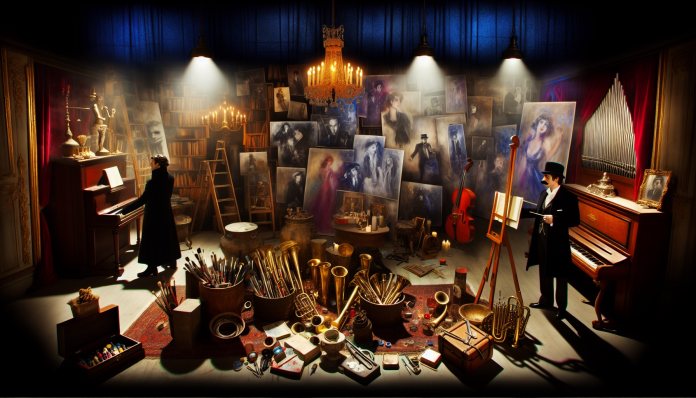Introduction
Oscar Wilde, the iridescent figure of the late 19th century literary scene, was renowned for his flamboyant wit, dazzling plays, and a lifestyle that was as intricate and colorful as his prose. However, beneath the layers of his clever epigrams and society’s admiration lay a tumultuous personal life riddled with secret love affairs that would ultimately lead to a catastrophic scandal. Wilde’s 1895 trial for “gross indecency” not only marked the end of his literary career but also shed light on the intense moral scrutiny and societal standards regarding sexuality in Victorian Britain.
In an era characterized by rigid societal norms and a penchant for hypocrisy, Wilde’s experiences provide a fascinating lens through which to examine historical attitudes toward homosexuality and sexual freedom. His life and trial are pivotal for understanding the intersections of sexual identity, societal judgment, and artistic expression—issues that continue to resonate in modern discourse.
The Scandal
Context and Background
The late Victorian period was marked by a strict moral code that emphasized propriety, sexual restraint, and an overarching sense of decorum. Homosexuality was not only taboo; it was illegal, classified as a crime punishable by imprisonment. Despite the outward appearance of respectability, many high-profile figures engaged in secret lives that defied these moral standards. Oscar Wilde was no exception.
Wilde’s sexual orientation was a subject of speculation long before the scandal broke. His relationships, notably with younger men such as Lord Alfred Douglas (often referred to as “Bosie”), became the crux of a public uproar. It was a love affair stained by secrecy, laden with the risks associated with queer love in a hostile environment. Their relationship awakened the latent fears of the Victorian elite, who feared what they perceived as degeneracy.
The Trial
The chain of events leading to Wilde’s trial began when the Marquess of Queensberry, Bosie’s father, publicly accused Wilde of being a homosexual. Infuriated, Wilde sued him for libel; however, this decision backfired spectacularly. The trial turned into a sensational spectacle that captured the public’s imagination, stirring both fascination and outrage.
Key moments from the trial included:
- Wilde’s Letters: Personal letters detailing his affection for Douglas were entered as evidence, painting Wilde as a man entangled in a forbidden romance.
- Witness Testimonies: Several young men testified against Wilde, revealing the clandestine nature of his relationships and contributing to a narrative of sexual predation.
- Public Reaction: The trial drew significant media attention, with reactions ranging from approval to outrage; many were captivated by the ensuing scandal while others condemned Wilde for his perceived moral failings.
In May 1895, Wilde was convicted and sentenced to two years of hard labor, a punishment emblematic of the harsh societal attitudes toward homosexuality. The news devastated his health and reputation, shattering the once adulated playwright’s life.
Moral and Cultural Analysis
Societal Reaction
Victorian society was rife with contradictions: while it revered intellectual and artistic achievement, it vilified those who dared to step outside the constraints of sexual propriety. Wilde’s trial revealed the hypocrisy of an elite class that indulged in hidden affairs while denouncing open expressions of love, particularly those regarded as deviant.
Consequences for Wilde were dire:
- Imprisonment: He served his sentence at Reading Gaol, which dramatically altered his health and left a lasting impact on his later works.
- Social Exile: Upon his release, Wilde found himself ostracized, unable to return to the social circles that had once celebrated him. He fled to France, living the remainder of his life in relative obscurity.
A Modern Perspective
In today’s climate, the public’s reaction to Wilde’s scandal would likely be far less hostile. The cultural conversation around sexuality has evolved drastically, with greater acceptance and legal rights for LGBTQ+ individuals. Concepts of love and personal freedom have transformed, reflecting a more nuanced understanding of human relationships.
- Legalization of Same-Sex Relationships: Countries across the globe have progressed towards accepting same-sex love with the legalization of same-sex marriage and anti-discrimination laws.
- Cultural Representation: LGBTQ+ narratives have become more prominent in literature, film, and society, prompting discussions about the celebrated complexities of love beyond societal norms.
- Even sexual fluidity is acknowledged, reflecting a profound shift from rigid categories to a more inclusive understanding of diverse sexual orientations.
Conclusion
The tragic love affair and the ensuing trial of Oscar Wilde serve as a poignant reminder of a time when society’s rigid norms stymied personal freedoms and artistic expression. His life illustrates not only the struggles faced by LGBTQ+ individuals in past generations but also the profound societal change that has occurred over time.
Reflecting on Wilde’s legacy encourages a critical examination of how far we have come in terms of acceptance and understanding. It also calls for an awareness of the moral judgements that persist today, as many individuals still navigate the complexities of identity, love, and societal expectations.
As we delve into Wilde’s life, may readers find inspiration in his defiance of convention and an appreciation for the ongoing journey toward equality and acceptance. The shadows of our past may illuminate the path forward, challenging us to confront and embrace the beautiful complexity of human relationships in all their forms.

